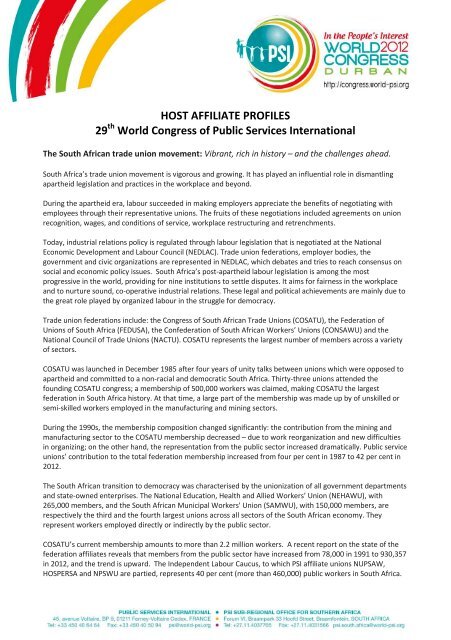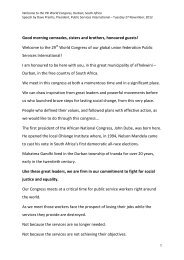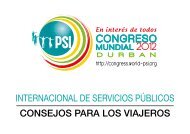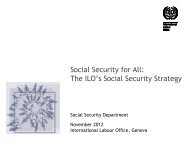HOST AFFILIATE PROFILES 29th World Congress ... - PSI Congress
HOST AFFILIATE PROFILES 29th World Congress ... - PSI Congress
HOST AFFILIATE PROFILES 29th World Congress ... - PSI Congress
You also want an ePaper? Increase the reach of your titles
YUMPU automatically turns print PDFs into web optimized ePapers that Google loves.
<strong>HOST</strong> <strong>AFFILIATE</strong> <strong>PROFILES</strong>29 th <strong>World</strong> <strong>Congress</strong> of Public Services InternationalThe South African trade union movement: Vibrant, rich in history – and the challenges ahead.South Africa’s trade union movement is vigorous and growing. It has played an influential role in dismantlingapartheid legislation and practices in the workplace and beyond.During the apartheid era, labour succeeded in making employers appreciate the benefits of negotiating withemployees through their representative unions. The fruits of these negotiations included agreements on unionrecognition, wages, and conditions of service, workplace restructuring and retrenchments.Today, industrial relations policy is regulated through labour legislation that is negotiated at the NationalEconomic Development and Labour Council (NEDLAC). Trade union federations, employer bodies, thegovernment and civic organizations are represented in NEDLAC, which debates and tries to reach consensus onsocial and economic policy issues. South Africa’s post-apartheid labour legislation is among the mostprogressive in the world, providing for nine institutions to settle disputes. It aims for fairness in the workplaceand to nurture sound, co-operative industrial relations. These legal and political achievements are mainly due tothe great role played by organized labour in the struggle for democracy.Trade union federations include: the <strong>Congress</strong> of South African Trade Unions (COSATU), the Federation ofUnions of South Africa (FEDUSA), the Confederation of South African Workers’ Unions (CONSAWU) and theNational Council of Trade Unions (NACTU). COSATU represents the largest number of members across a varietyof sectors.COSATU was launched in December 1985 after four years of unity talks between unions which were opposed toapartheid and committed to a non-racial and democratic South Africa. Thirty-three unions attended thefounding COSATU congress; a membership of 500,000 workers was claimed, making COSATU the largestfederation in South Africa history. At that time, a large part of the membership was made up by of unskilled orsemi-skilled workers employed in the manufacturing and mining sectors.During the 1990s, the membership composition changed significantly: the contribution from the mining andmanufacturing sector to the COSATU membership decreased – due to work reorganization and new difficultiesin organizing; on the other hand, the representation from the public sector increased dramatically. Public serviceunions’ contribution to the total federation membership increased from four per cent in 1987 to 42 per cent in2012.The South African transition to democracy was characterised by the unionization of all government departmentsand state-owned enterprises. The National Education, Health and Allied Workers’ Union (NEHAWU), with265,000 members, and the South African Municipal Workers' Union (SAMWU), with 150,000 members, arerespectively the third and the fourth largest unions across all sectors of the South African economy. Theyrepresent workers employed directly or indirectly by the public sector.COSATU’s current membership amounts to more than 2.2 million workers. A recent report on the state of thefederation affiliates reveals that members from the public sector have increased from 78,000 in 1991 to 930,357in 2012, and the trend is upward. The Independent Labour Caucus, to which <strong>PSI</strong> affiliate unions NUPSAW,HOSPERSA and NPSWU are partied, represents 40 per cent (more than 460,000) public workers in South Africa.
Democratic Nursing Organisation of South Africa (DENOSA)The Democratic Nursing organization of South Africa (DENOSA) was established in December 1996 as a tradeunion and a professional body that represents nurses and nursing in South Africa.Currently DENOSA represents a membership of over 80,000 nurses in the public and private sector. It is thelargest nurses’ organization aiming at uniting, empowering, educating, supporting nurses and influencing healthpolicy at all levels of care locally, regionally and internationally.The vision statement: “Nurses united in pursuing service excellence” translates into internal and externalmissions. It is DENOSA’s mission to support, represent and develop its members and the external missionpledges an empowered nursing cadre: serving, caring and advocating for society.At the international level, DENOSA affiliates with the International Council of Nurses (ICN), the CommonwealthNurses Federation (CNF) and Public Services International (<strong>PSI</strong>). Regionally, it is affiliated with Southern AfricanNetwork of Nurses and Midwives (SANNAM) and the East Central and Southern Africa College of Nursing(ECSACON). Locally, DENOSA affiliates with the <strong>Congress</strong> of South African Trade Unions (COSATU).In line with its vision and mission DENOSA has made a number of inroads in influencing policy. Responding to thedebacle of South African nurses emigrating, DENOSA was instrumental in signing of the Occupational SpecificDispensation (OSD) agreement that was introduced to attract and retain nursing professionals and to revise thesalaries and other employment condition structures for nurses. In addressing the challenges faced by nursing inSouth Africa, DENOSA played a crucial role in the drafting of the Nursing Strategy for South Africa.Although DENOSA has its roots in unionism and representing the workplace interests of members, DENOSA tooknotice of the global developments amongst nursing unions to also include professional development of theirmembers as part of their core focus. Therefore, the DENOSA Professional Institute (DPI), which seeks to advancethe nursing profession including developing leaders capable of improving service delivery even in the context ofthe ever changing health environment, was revived with the support of a substantial grant from the AtlanticPhilanthropies.DENOSA represents a profession which is subject to ongoing and serious challenges. South Africa faces a hugedisease burden – particularly infectious diseases but also a rise in chronic diseases of lifestyle – and the publichealth care system is characterized by ageing infrastructure, shortages of qualified personnel, particularly at themanagement level, and a huge demand for service. Nurses provide an essential service and yet are not alwaysadequately compensated or valued by society.www.denosa.org.za3
Health and Other Service Personnel Trade Union of South Africa (Hospersa)Hospersa is a democratic, worker-driven organisation, which represents 50,000 members in public health, publicwelfare, education and the general public service as well as a further 18,000 members in private health, privatewelfare and private general (including SA National Parks and Ezemvelo KZN Wildlife).It was founded some 60 years ago when a group of public servants pushed for the formation of the HospitalServants Association of South Africa, which subsequently, in 1989, merged with the Association of CapeProvincial Hospitals to form Hospersa. It was recognised and registered as a trade union on 3 June 1994.Hospersa is affiliated nationally to the Federation of Unions of SA (a politically non-aligned labour federation)and internationally to Public Services International.The union operates in all nine provinces of the country, and is one of the leading members of the IndependentLabour Caucus, which negotiates salary increases and better working conditions for public sector members. It isalso an active role player in the private sector, particularly in the Netcare group (one of SA’s largest privatehealth care providers), where it is the majority trade union.Hospersa is an acknowledged leader in the health and safety arena, where it has scored victories for publicsector nurses exposed to multidrug-resistant tuberculosis; negotiated for the provision, by Netcare, of safetyshoes for theatre staff; and campaigned for safety legislation for health care workers.Some of the workplace challenges Hospersa is currently dealing with include major human resources shortagesand chronic corruption in the public health sector – both of which are detrimental to the provision of effectivehealth care services.Hospersa General Secretary Noel Desfontaines believes that Hospersa’s independence from political affiliationwill provide the union with opportunities to grow its membership in an evolving labour environment, whereworkers are beginning to question the authenticity of labour representation within a political alliance.www.hospersa.co.za4
National Public Service Workers Union (NPSWU)The National Public Service Workers Union was established during apartheid, in 1962, as the Hospital Non-European Staff Association (HNESA) when there was no staff association for black public servants in KwaZulu-Natal province (KZN). The union was started by a group of health workers in the public health sector as one ofthe first truly racially integrated unions. Its membership was initially limited to hospital workers employed by theprovince. It then extended to include other workers employed provincially and nationally by other public sectordepartments. In 2003 it adopted the current name, National Public Service Workers Union (NPSWU), indicatingthe willingness to organize outside the province. NPSWU has close to 8,000 members today.NPSWU is politically non-aligned and is affiliated to the National Council of Trade Unions (NACTU), to the PublicServants Association (PSA) and to <strong>PSI</strong>.NPSWU takes an active role in the <strong>PSI</strong> Quality Public Services-Action Now! (QPS) campaign. NPSWU participatedin the recent establishment of a QPS working group, in alliance with the Ethekwini Municipality (Durban) andcivil society.According to Daya Jankisperad, chairperson of the group, “The QPS working group identified a number of keyissues to assist the municipality in improving the quality of its services.”The first task was the promotion of a community centre to improve access to government and related servicesfor approximately 100 000 people in the rural communities of uMnini, KwaZuluNatal, and surrounding areas.The union organized a campaign to raise awareness about the centre among citizens.http://npswu.org6
National Union of Public Service and Allied Workers (NUPSAW)The National Union of Public Service and Allied Workers represents a membership of 30,000 workers in publichealth and general public services.Success Mataitsane, the General Secretary, explaining the union’s main goal, says: “For us it is important thatthe workers are happy when they wake up in the morning to go to work.” The strategy aimed at achieving thisgoal is based on four pillars: good working conditions, with particular respect to health and safety, andpromoting a pleasant work environment free from racism and based on respect between employers, supervisorsand employees, a decent salary, and job security.Free nurses’ indemnity cover, free funeral cover and 30 per cent reimbursement of the registration fees paid bynurses and other professionals to their respective councils are unique benefits offered by NUPSAW to itsmembers.The struggle against outsourcing of public services is one of the main challenges the union is facing. Mataitsaneexplains that, “Security, gardening, cleaning and other services in the public sector were considered non-coreservices and therefore outsourced to cut costs. Nonetheless, because of the inclusion of independent serviceproviders – the overall cost paid by the public sector is higher while wages and working conditions havedeclined.” NUPSAW started a recruitment campaign among contract workers aiming at organizing them andfighting together to bring certain outsourced services back in-house.NUPSAW considers independence from political parties as well as from employers as being a trademark of itsapproach. In order to represent its members effectively, the union became a founding party to the IndependentLabour Caucus (ILC) in 2007, which includes 11 independent unions. The ILC, although it is not a registeredfederation, is recognised in the South African Public Service Co-ordinating Bargaining Council (PSCBC) and itssectoral councils. The ILC represents 40 per cent of the public servants in South Africa.NUPSAW is affiliated to the Confederation of South African Workers’ Unions that was established in 2003.NUPSAW is a founding member of this confederation.www.nupsaw.co.za7
Police and Prisons Civil Rights Union (POPCRU)The Police and Prisons Civil Rights Union (POPCRU) organises employees in the South African Police Service(SAPS), the Department of Correctional Services (DCS) and the traffic component.POPCRU represents more than 150,000 police, correctional and traffic officials. The union was established inNovember 1989, at the height of the struggle against apartheid. Prior to the establishment of POPCRU,institutional racism was entrenched within SAPS, the DCS and the traffic component. There were huge salarydisparities among various racial groupings and serious challenges with regard to promotion of black employees.At the beginning, POPCRU served as a voice for black security services members who were compelled to enforcethe apartheid laws and therefore excluded from the communities they had to serve. POPCRU’s founding beliefwas to integrate policing back into the community. The union had to operate in a hostile political environmentas management was reluctant to accept the establishment of a union for black employees.POPCRU has been fighting to take forward the transformation agenda and to tackle racial divisions amongworkers. POPCRU was able to build relations with management and has propelled the establishment ofindependent bargaining structures.Education is one of the main goals of the union, with ongoing leadership and membership developmentprogrammes. Internal democracy and collective leadership are founding principles.POPCRU actively supported the establishment of police service trade unions in Swaziland, Lesotho andBotswana. It is also affiliated to the <strong>Congress</strong> of the South African Trade Unions (COSATU).http://popcru.org.za8
South African Democratic Nurses Union (SADNU)Freddie Mohai, General Secretary of the South African Democratic Nurses Union, says the focus for SADNU,which has dealt with internal and external challenges in recent years, is on “rebuilding the union with the visionof uniting the nurses of South Africa.”SADNU, founded in 1995, represents nurses at the national level, mainly from the public sector. Its headquartersis in Bloemfontein, Free State province. It has been affiliated to COSATU since 2000. This represented a majorturning point in its trajectory, as its membership subsequently increased significantly. Since 2010, it is alsoaffiliated to Public Services International (<strong>PSI</strong>).At the moment it represents a relatively small membership of 8,200. This has required SADNU to join withanother <strong>PSI</strong> affiliate union, POPCRU (Police and Prisons Civil Rights Union), in order to be part of the bargainingprocesses at the Public Service Co-ordinating Bargaining Council.The high competition in the health sector and internal crises, as well as the fact that leaders are unpaid, and thusfind it difficult to effectively service the union, has hindered growth in SADNU’s membership. The union hasbeen de-registered since the beginning of 2012. Currently, the main project is to finalize its re-registrationprocess, which will enable the union to hold provincial and national congresses soon. In order to move forward,a major recruitment campaign has also been put in place, coupled with marketing efforts. SADNU counts astrong victory in achieving a package for improving and upgrading the salaries of nurses through OccupationSpecific Dispensation (OSD.9
South African Municipal Workers’ Union (SAMWU)The South African Municipal Workers’ Union was founded in 1987 to organize workers employed directly andindirectly by the local government, or by public, private or voluntary service providers for the local authority.With its 180,000 members, SAMWU is the largest local government trade union in South Africa. Its membersinclude employees in municipalities and local authorities in administrative services, health, libraries, sanitation,waste management, road construction and electricity.SAMWU is affiliated with the <strong>Congress</strong> of South African Trade Unions (COSATU) and joined Public ServicesInternational (<strong>PSI</strong>) in June 1991.A strong commitment to building worker-led democratic structures and to sustaining membership participationin policy and decision making is a pivotal feature of SAMWU. The building of a conscious shop stewardmovement, the fight against discrimination and the development of workers’ solidarity nationally andinternationally are also prominent activities.The main current campaigns promoted by SAMWU aim at fighting corruption in the local government sector andpromoting pay parity among local government employees. The latest chapter in SAMWU’s longstandingcampaign against corruption started with a march on 5 October 2012 in Polokwane, Limpopo, one of provincesmost affected by corruption in South Africa.SAMWU national spokesperson Tahir Sema explains how “the fight for pay parity and against corruption meansfighting for better quality of public services.” On the one hand, nepotism and corruption may incapacitate localdelivery of services while, on the other, a decent living wage will promote workers’ commitment to the publicinterest.The concern about wage disparity is echoed by newly-elected General Secretary Walter Theledi, who argues:“Municipal workers’ patience is wearing thin (…) as the South African Local Government Association’s arrogantbehaviour was further displayed as it continued this year to give municipal managers and councillors hugeincreases in salaries and allowances.”www.samwu.org.za10





